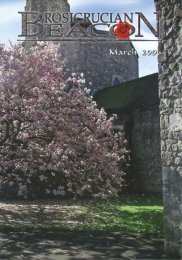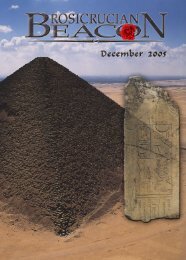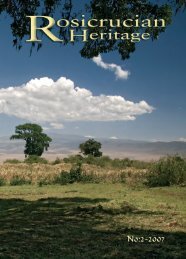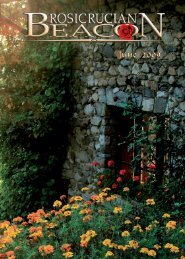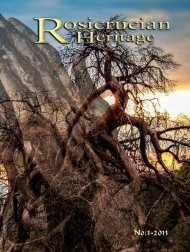Klaas-Jan BAKKER - AMORC
Klaas-Jan BAKKER - AMORC
Klaas-Jan BAKKER - AMORC
Create successful ePaper yourself
Turn your PDF publications into a flip-book with our unique Google optimized e-Paper software.
the “Science of Revelation.” This esotericism<br />
signifies “…a light that shines in the soul when it is<br />
The more the mind divides its attention<br />
among several things, the less capable it is<br />
to comprehend the truth.<br />
cleansed and purified of its blameworthy qualities; it<br />
means knowledge and only knowledge.”<br />
The first book of the Revival, the Kitab<br />
al-Ilm (Book of Knowledge) outlines some of al-<br />
Ghazali’s ideas concerning the morality and duties<br />
of the mystic student on the Path. Below you will<br />
find the main ideas set out in these ten duties, as<br />
an insight into Islam and Islamic mysticism.<br />
The First Duty<br />
The student must purify his soul from impure<br />
traits and blameworthy characteristics, because<br />
knowledge is the worship of the heart, the<br />
prayer of his inner self, and the oblation of his<br />
inward being before God. It is more important<br />
to avoid the impurities of the heart than to avoid<br />
(exclusively) physical impurities, since, besides<br />
their abomination in this world, the impurities of<br />
the heart, anger, lust, rancour, envy and pride, are<br />
fatal in the world to come.<br />
The Second Duty<br />
The student must reduce to a minimum his ties<br />
with worldly affairs and leave his family and<br />
country because such ties occupy his time and<br />
divert his attention. Furthermore, as God has<br />
not given man two minds, the more the mind<br />
divides its attention among several things, the<br />
less capable it is to comprehend the truth. Such a<br />
mind is like a stream, the water of which flows in<br />
several directions only to be absorbed in part by<br />
the earth and in part by the air with the result that<br />
nothing is left for irrigation of planted fields.<br />
The Third Duty<br />
The student must not scorn knowledge nor<br />
exalt himself over the teacher, but rather,<br />
entrust to the teacher the conduct of his<br />
affairs and submit to his advice, just as the<br />
patient would submit to a sympathetic and clever<br />
physician. He should humble himself before his<br />
teacher, and through service, seek reward and<br />
honour. A manifestation of the student’s pride<br />
is his reluctance to heed the advice of anyone<br />
except the popular and well-known teachers.<br />
Whatever the teacher should recommend to the<br />
pupil, the latter should follow, putting<br />
aside his own opinion, since his teacher’s<br />
faults are more useful to him than his own<br />
right judgements and because experience<br />
would reveal details that might be strange<br />
but are nevertheless, very useful.<br />
The Fourth Duty<br />
The student must at first pay no attention to<br />
the numerous differences of opinion that exist<br />
among people, whether in the secular sciences<br />
or in the sciences of the hereafter, because they<br />
A manuscript from the Mamluk period (1250-1517) in Egypt and<br />
Syria. This is Abu Hamid Muhammad bin Muhammad al-Ghazali’s<br />
al-Tabr al-Masbuk fi Nasihat al-Muluk wa al-Wuzara wa al-<br />
Wulat (MS:l72.2:G4ltbA), a manual of advice composed for rulers,<br />
ministers and governors on how they should govern their realms. It<br />
was probably reproduced in Egypt at the beginning of the fifteenth<br />
century.<br />
would confuse and perplex his mind, cool his<br />
enthusiasm and cause him to despair of ever<br />
learning anything. Rather, he should first master<br />
the one and only praiseworthy way satisfactorily<br />
Knowledge, whether higher or lower, either<br />
leads men to God or helps them a little on<br />
their way.<br />
to his teacher and then attend to the other schools<br />
of thought and questionable ideas. He should<br />
be on the lookout to see whether his teacher is<br />
capable of reaching independent opinions or is<br />
in the habit of repeating those of the different<br />
The Rosicrucian Beacon -- December 2007<br />
41



